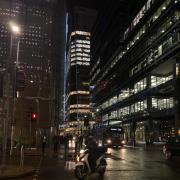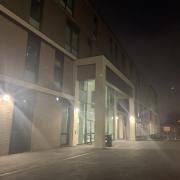
Should the West Cut Ties with Saudi Arabia? It is a question that has baffled foreign policy makers and is a hot topic amongst the British public today, especially following the tragic murder of Saudi journalist Jamal Khashoggi in Istanbul. It was then in no doubt that the debate was likely to cause fireworks.
Upon entering, the audience were given the oppurtinity to vote with the chair, the BBC's award-winning chief international correspondent, Lyse Doucet announcing the results as 41% for the motion, 22% against and 37% undecided.
The debate, organised by Intelligence2 began with Mehdi Hasan's opening statement. As a journalist for Al Jazeera and a prominent critic of Saudi Arabia, his opening motion was empassioned, appealing to the audience by naming Saudi Women Rights activists and dissidents who are being tortured and kept in prison for no particular crime. He also gave voice to the victims of the war in Yemen, heavily criticising Saudi Arabia for their involvement. He ended his speech, slamming the Saudis' involvement with terrorism groups citing Algerian writer Kamel Daoud who described Saudi Arabia as "An ISIS that made it."
Next to take the podium was Mamoun Fandy, an Egyptian-born Middle East expert and president of the think tank London Global Strategy Institute. Having just come out of a sick-bed he offered a more calm and nuanaced perspective against the motion. He first criticised the description of the "West" pointing out the ambiguity of the title and criticised Medhi Hasan's previous argument, arguing that it was simply not good foreign policy to cut ties with a country on the basis that you did not like it.
Madawi al-Rasheed, a Saudi Arabian professor of social anthropology at the Middle East Centre at the London School of Economics, followed arguing for the motion. She opened with a personal history recounting how the Saudi Arabian government threatened consequences if she published her P.h.d and later withdrew her Saudi citizenship. She agreed with Mamoun Fandy about the ambiguity of the title: "The West" but ultimately called for the end of the 'unconditional support' that the West offered Saudi Arabia, pointing to the recent crisis in Venezuela where president Maduro was condemned and given an ultimatium to call new free and fair elections. She asked the question: "Where is Saudi Arabia's ultimatium?"
The last speaker, and arguably the weakest of the night, was Crispin Blunt, Conservative MP for Reigate and widely regarded as one of the most experienced foreign policy voices in Parliament. He spent the first part of his opening speech seemingly arguing for the motion, pointing out the various human rights abuses that him and his team had issued in a report that was to be published that very night, which caused the audience to look in each other in confusion wondering if he had missed the memo. Nonetheless, he maintained that the best way to influence Saudi Arabia was from within and cited his own visits to the country and how impressed he was of Mohammed Bin Salman, the current leader of the Kingdom of Saudi Arabia.
The opposition was quick to pounce on the MP's quite frankly poor speech with Mehdi Hasan announcing, "You should be on this side of the debate." and Madawi al-Rasheed pointing out that when Mr Blunt had tried to send people to investigate the murder of Jamal Khashoggi, Saudi Arabia had refused, indicating that they did not value the British influence.
This argument was later returned to during the question segment of the debate, with one member of the audience questioning the imperialist stance that the Conservative MP appeared to be taking. The oppostion were also grilled on the selling of weapons to Saudi Arabia and the influence of Saudi Arabia in terrorism in the UK.
This is not say that the speakers for the motion were not also put under some hot water. One questioned how far they were willing to go in "cutting ties" Saudi Arabia and another questioned why one would even want to cut ties with the beacon of stability in the otherwise unstable Middle East. To which Mehdi Hasan tactfully replied "What stability?"
As the closing statements were made, the audience was given an oppurtunity to vote on the issue. Lyse Doucet then announced the final vote 63% for the motion, 32% against the motion and 5% undecided.
A clear win for the argument that the West should cut ties with Saudi Arabia, though if this will ever be implemented into foreign policy remains to be seen.





























